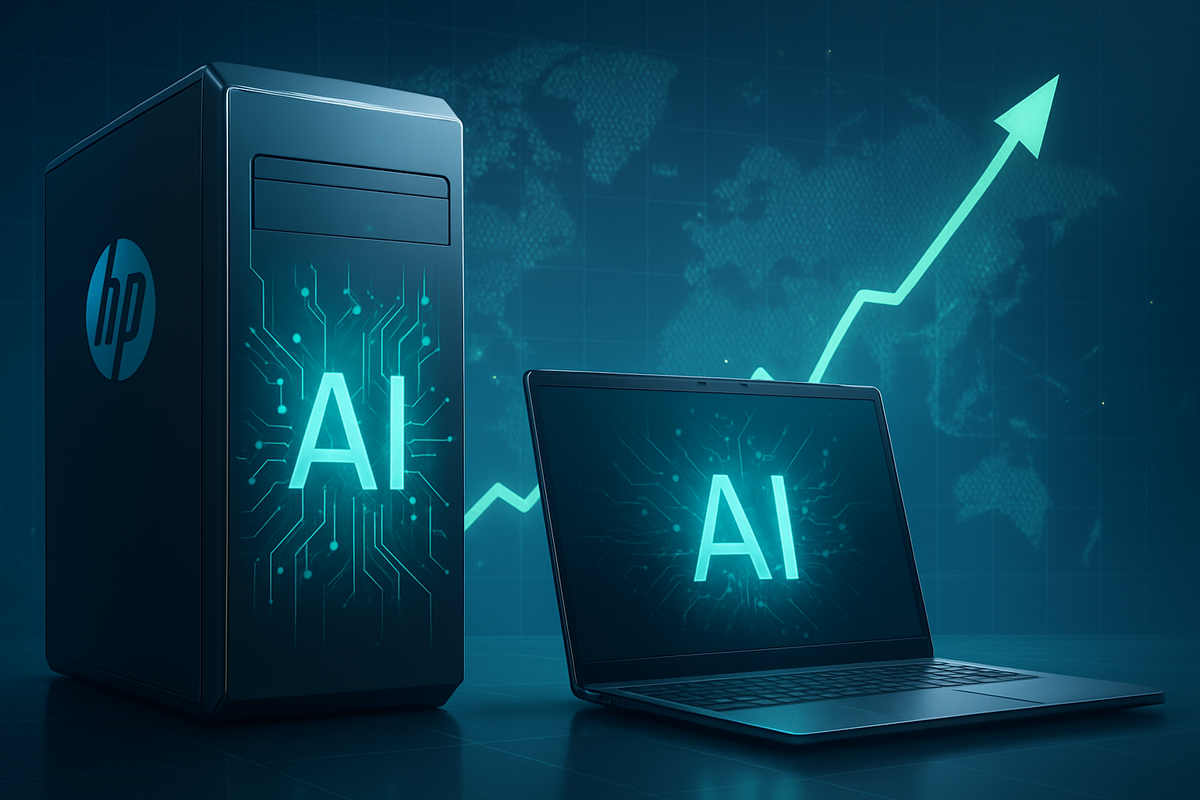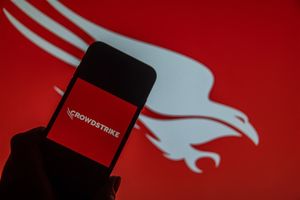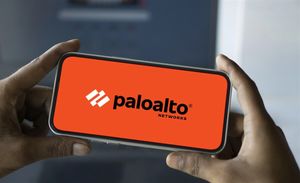Financial News
HP Inc. Soars on Landmark AI Manufacturing Partnership, Signaling Broader Market Confidence in AI Future

HP Inc. (NYSE: HPQ) experienced a significant surge in its stock price on November 21, 2025, climbing by an impressive 6.24% to 6.94% in a single day. This substantial rally was ignited by the announcement of a strategic artificial intelligence (AI) partnership with SAMI Advanced Electronics, marking a pivotal moment for the technology giant. The collaboration is set to revolutionize manufacturing, focusing on producing millions of AI-integrated computers in Saudi Arabia by 2030, specifically targeting the burgeoning enterprise market.
This pre-emptive rally, occurring ahead of HP's official fourth fiscal quarter 2025 earnings report, underscores a profound shift in investor sentiment and a strong belief in the company's long-term vision. The market's enthusiastic reaction to HP's strategic pivot into AI-driven manufacturing with a prominent regional partner reflects not only confidence in HP's innovative capabilities but also mirrors a broader global trend of aggressive investment and accelerated adoption within the artificial intelligence ecosystem.
HP's Strategic AI Gambit: A Deep Dive into the SAMI Partnership
The recent stock surge of HP Inc. (NYSE: HPQ) is directly attributable to its strategic partnership with SAMI Advanced Electronics, a landmark initiative poised to redefine AI-driven manufacturing. This collaboration is not merely an incremental step but a bold move to establish a significant manufacturing footprint in Saudi Arabia, with the ambitious goal of producing millions of AI-integrated computers by 2030. The primary focus will be on catering to enterprise customers, providing them with cutting-edge computing solutions embedded with advanced artificial intelligence capabilities. This move positions HP at the forefront of the AI hardware revolution, especially in emerging regional markets.
The November 21, 2025, stock rally was a culmination of HP's consistent strategic maneuvering throughout the year to solidify its position in the AI landscape. Earlier in February 2025, HP made headlines with the acquisition of key AI capabilities from Humane, a move aimed at developing a new generation of AI-powered devices. This was followed by a partnership with Reincubate in March/April 2025, focusing on enhancing on-device video and video conferencing experiences by leveraging Neural Processing Units (NPUs) in HP's next-generation AI PCs. Furthermore, at its Amplify 2025 Conference in March, HP unveiled an extensive lineup of AI-powered PCs and services, signaling a clear and comprehensive commitment to integrating AI across its product portfolio. The SAMI Advanced Electronics partnership, however, served as a particularly strong and immediate catalyst, demonstrating HP's intent to not just develop but also mass-produce AI-enabled hardware on a global scale.
Key players in this transformative event include HP Inc. (NYSE: HPQ), a global technology leader, and SAMI Advanced Electronics, a significant entity in the Saudi Arabian defense and technology sectors. Their collaboration transcends traditional manufacturing agreements, venturing into a strategic alliance that leverages SAMI's regional presence and manufacturing prowess with HP's technological innovation and market reach. The initial market reaction was overwhelmingly positive, with HP's stock climbing by 6.24% to 6.94% on the day of the announcement. This significant jump reflected robust investor confidence, indicating a positive shift in market sentiment towards HP's long-term vision and its aggressive pivot into the burgeoning artificial intelligence sector. Analysts and investors alike are viewing this partnership as a strong indicator of HP's potential for significant growth in the AI sector and new regional markets, validating its strategic investments throughout 2025.
Market Movers: Winners and Losers in the AI Race
The strategic AI partnership between HP Inc. (NYSE: HPQ) and SAMI Advanced Electronics is poised to create distinct winners and losers within the competitive technology landscape. Foremost among the winners is HP Inc. itself. This partnership not only opens up a vast new market in Saudi Arabia and potentially the broader Middle East but also solidifies HP's reputation as a leader in AI hardware manufacturing. By committing to AI-driven production, HP is differentiating itself from competitors and tapping into a high-growth segment, promising increased revenue streams and market share. SAMI Advanced Electronics also emerges as a significant winner, gaining access to HP's cutting-edge AI technology and expertise, which will undoubtedly boost its manufacturing capabilities and strategic importance within the region. Furthermore, companies involved in the supply chain for AI components—such as NPU manufacturers, advanced chipmakers, and AI software developers—are likely to benefit from the increased demand generated by this large-scale production initiative.
Conversely, the event casts a shadow over companies that are slower to adapt to the pervasive integration of AI. Traditional PC manufacturers who have not yet articulated or executed a robust AI strategy could find themselves losing market share to HP's AI-powered offerings. The competitive pressure will intensify for companies that rely on conventional manufacturing processes or lack the strategic partnerships necessary to scale AI production effectively. This includes smaller players who may struggle to invest in the advanced infrastructure and R&D required for AI integration, potentially leading to consolidation within the industry as larger, more agile companies like HP seize the opportunity. The partnership also underscores the importance of regional manufacturing hubs, potentially disadvantaging companies heavily reliant on distant or less flexible supply chains.
The ripple effect extends to the broader enterprise technology market. Businesses that successfully integrate HP's AI-enabled computers will gain a competitive edge through enhanced automation, advanced analytics, and improved operational efficiency. This could compel other enterprise solution providers to accelerate their own AI adoption, creating a virtuous cycle of innovation. However, companies that fail to leverage AI effectively in their own operations or product offerings risk falling behind, facing challenges in attracting tech-savvy clients and retaining relevance in an increasingly AI-driven economy.
Broader Implications: AI's Hypergrowth and Global Shifts
HP Inc.'s (NYSE: HPQ) strategic partnership with SAMI Advanced Electronics is more than just a corporate deal; it's a microcosm of the profound shifts occurring across the global technology landscape, particularly within the realm of artificial intelligence. This event squarely fits into the broader industry trend of AI's "hypergrowth mode," characterized by unprecedented capital inflows and accelerated adoption across virtually every sector. Global AI investment is estimated to reach between USD 200 billion and $280 billion in 2025, with some projections indicating major corporations planning to spend over $364 billion on AI infrastructure alone. HP's move to integrate AI directly into manufacturing and enterprise hardware aligns perfectly with this trend, demonstrating how companies are strategically positioning themselves to capture a share of the rapidly expanding AI market, projected to hit $391 billion in 2025.
The ripple effects of such a significant partnership are multifaceted. Competitors in the PC and enterprise hardware markets will face immense pressure to accelerate their own AI integration strategies, either through similar partnerships, acquisitions, or aggressive internal R&D. This could lead to a wave of innovation, but also potential consolidation as smaller players struggle to keep pace. The emphasis on manufacturing in Saudi Arabia also highlights a broader geopolitical trend towards diversifying supply chains and fostering regional technological self-sufficiency, potentially inspiring similar initiatives in other emerging markets. Regulatory and policy implications will also grow in prominence; as AI becomes more embedded in critical infrastructure and enterprise operations, governments will likely introduce more stringent guidelines regarding data privacy, ethical AI development, and cybersecurity, creating both challenges and new opportunities for compliance-focused solutions.
Historically, this moment echoes past technological paradigm shifts, such as the rise of the internet or the mobile revolution. In each instance, companies that forged strategic alliances, invested heavily in nascent technologies, and focused on practical applications gained significant first-mover advantages. HP's proactive stance with AI-driven manufacturing could be seen as a modern parallel, aiming to establish an early and dominant position in the next era of computing. This aggressive push into AI also validates the massive venture capital funding poured into generative AI startups, which reached $67 billion in 2025, showing that investor confidence is high for tangible AI applications and not just theoretical advancements. The partnership serves as a clear signal that AI is moving beyond the conceptual stage and into mass-market, enterprise-level deployment, reshaping industries and economies on a global scale.
The Road Ahead: Navigating AI's Evolving Landscape
The strategic partnership between HP Inc. (NYSE: HPQ) and SAMI Advanced Electronics heralds a new chapter for HP and the broader tech industry, presenting both immediate opportunities and long-term strategic considerations. In the short term, all eyes will be on the execution of the Saudi Arabian manufacturing initiative. Investors will closely monitor HP's upcoming earnings reports for insights into the financial impact and progress of this venture. Further announcements regarding the specific product lines to be manufactured, the timeline for production ramp-up, and initial market reception from enterprise customers will be crucial indicators of success. The immediate future will also likely see HP leveraging this partnership to strengthen its position in the Middle Eastern market, potentially expanding its reach to other Gulf Cooperation Council (GCC) countries.
Looking further ahead, the long-term possibilities are transformative. This partnership could serve as a blueprint for HP to establish similar AI-driven manufacturing hubs in other strategic regions globally, diversifying its supply chain and customizing products for local markets. The evolution of AI PCs, with increasingly powerful Neural Processing Units (NPUs) and integrated AI capabilities, will continue to be a significant focus, driving innovation in user experience, security, and efficiency. HP's sustained integration of AI across its entire product portfolio, from consumer devices to enterprise solutions and services, will define its competitive edge. This will necessitate continuous R&D investment and a flexible strategic approach to adapt to rapidly evolving AI technologies and market demands.
For competitors, this event necessitates significant strategic pivots. Companies that have lagged in AI integration will face mounting pressure to catch up, either through internal development, strategic acquisitions, or new partnerships. Market opportunities will emerge for businesses specializing in AI infrastructure, specialized AI software, and consulting services that can help enterprises navigate the complexities of AI adoption and deployment. Potential scenarios range from a rapid acceleration of AI adoption across all industries, leading to a new era of productivity, to a more fragmented market where only a few dominant players with robust AI ecosystems thrive. The success of HP's venture with SAMI Advanced Electronics could also encourage other nations to invest heavily in localized high-tech manufacturing, driven by national security and economic development objectives.
Concluding Thoughts: HP's AI Bet and the Future Market
HP Inc.'s (NYSE: HPQ) stock surge, fueled by its strategic AI manufacturing partnership with SAMI Advanced Electronics, is a powerful testament to the transformative potential of artificial intelligence in today's financial markets. The key takeaway is clear: companies that demonstrate a clear, actionable, and ambitious strategy for AI integration are being heavily rewarded by investors. HP's move to establish AI-driven manufacturing in Saudi Arabia for enterprise computers is not just a tactical play but a strategic declaration of intent to lead in the next wave of technological innovation. This event underscores the market's strong belief in AI's ability to drive future growth, profitability, and competitive advantage.
Moving forward, the market will undoubtedly continue to be dominated by the AI narrative. Investment in AI infrastructure, research, and application development will only intensify, creating a dynamic and rapidly evolving landscape. HP's proactive approach, including its earlier acquisitions and product launches throughout 2025, positions it favorably within this burgeoning ecosystem. This partnership with SAMI Advanced Electronics further solidifies its commitment to not just developing AI, but also efficiently bringing AI-powered hardware to market at scale.
The lasting impact of this event is likely to be profound. It will reshape the competitive dynamics of the PC and enterprise hardware markets, encourage other tech giants to explore similar regional manufacturing partnerships, and accelerate the widespread adoption of AI across various industries. For investors, the coming months will be critical to watch. Key indicators will include the successful implementation of the SAMI partnership, HP's ability to meet its manufacturing targets, the profitability of its AI-centric product lines, and the competitive responses from other major players. Furthermore, monitoring regulatory developments around AI governance and data privacy will be essential, as these factors will increasingly influence the operational environment for AI-driven businesses. HP's bold AI bet appears to be paying off, setting a precedent for how established tech companies can successfully navigate and capitalize on the AI revolution.
This content is intended for informational purposes only and is not financial advice
More News
View MoreRecent Quotes
View More
Quotes delayed at least 20 minutes.
By accessing this page, you agree to the Privacy Policy and Terms Of Service.








